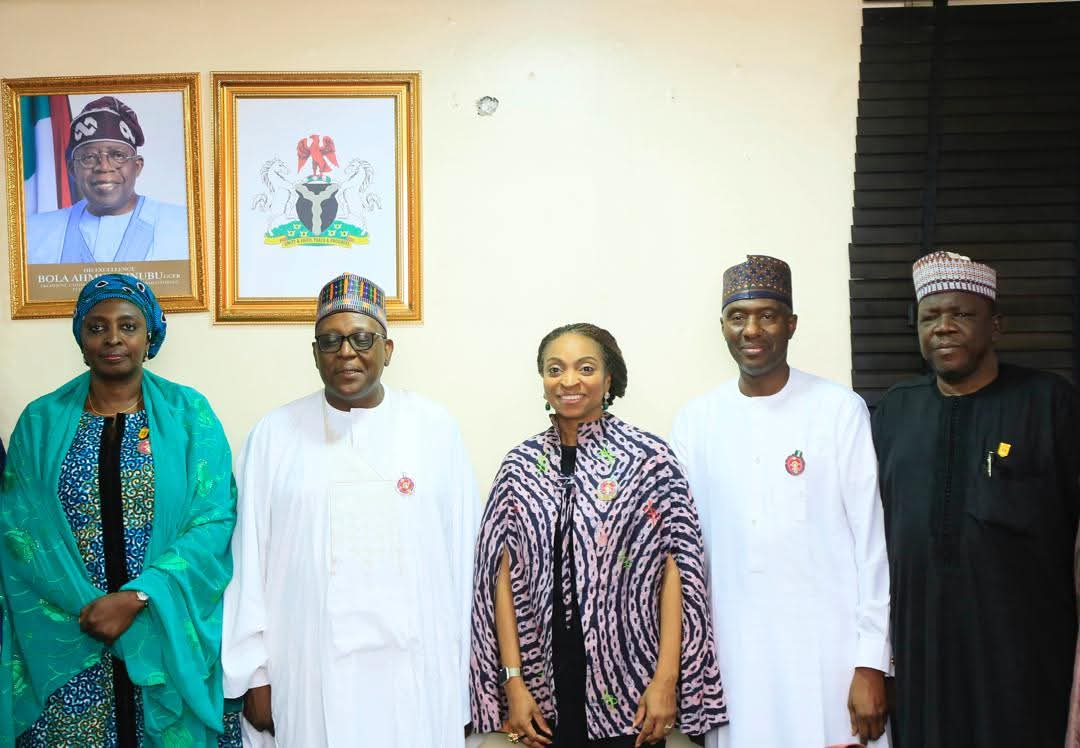Latest News
Federal Government moves to address food export irregularities, to unlock healthcare value chain

Press Release
Abuja, Nigeria - The Federal Ministry of Industry, Trade, and Investment (FMITI) and the Ministry of Health and Social Welfare have collaborated to tackle irregularities in the food export system and unlock the healthcare value chain for effective transformation.
This development was announced during a courtesy visit by the Minister of Health and Social Welfare, Dr. Muhammad Pate, to the Minister of Industry, Trade, and Investment, Dr. Jumoke Oduwole, in Abuja. The Director-General of the National Agency for Food and Drug Administration and Control (NAFDAC), Prof. Mojisola Adeyeye, was also in attendance.
The two ministries identified key areas of collaboration, including the regulation of food exports, the role of NAFDAC in enabling trade across borders, and the unlocking of the healthcare value chain. These efforts are aimed at supporting President Bola Tinubu's agenda towards transforming the economy.
"We are determined to ensure that Nigeria achieves greatly in these areas in the long run," said Dr. Oduwole. "We will start working on areas of unlocking the healthcare value chain, and we will identify areas of concern on the draft policy document."
Pate said that the issues have been lingering between the ministries and needed to be tackled effectively.
He said that the issues were important to the two ministries, adding that the effort was to support President Bola Tinubu in his agenda towards transforming the country.
“This meeting is bringing two sectors that are ordinarily not closely connected. But there are specific things that have prompted to reach out, which has to do with the exportation of food and its regulation.
“The second element is the role of the regulatory body, NAFDAC, in constraining or enabling the trade that we have across various borders.
“The third issue is the regulatory function links to our efforts to unlock the healthcare value chain.
“These are issues that have been lingering, and I thought we should use this opportunity to come together since we are all on the same team,” he said.
The minister said that the determination was to ensure that Nigeria achieved greatly in those areas in the long run.
Oduwole, while responding, said that both ministries would start working on areas of unlocking healthcare value chain.
She said that the issues were very vital and required effective measures to be tackled.
“I was briefed about the draft policy and medical devices of syringe and needles manufacturing in Nigeria.
“We have to identify the areas and resolutions, and to identify areas of the ministry’s concern on the draft policy document, and were we supposed to emit in further meeting with my ministry.
“The meeting is to discuss how to deliberate on the merit and demerit of the policy, as well as the issues of manufacturing.
” They are indeed under the eight-point agenda of Mr President,” she said.
The NAFDAC D-G said that Nigerians needed to change their mindsets in the area of exportation of goods, adding that those regulatory agencies should regulate effectively.
According to her, the effort will help to avoid the embarrassment of rejection of our goods.
Earlier, Mr Temiloluwa Oluokun, Technical Aide to industry, trade and investment ministry, mentioned some of the issues lingering in the ministry.
According to him, one of the issues from the regulatory reform programme was the denomination of permit fees in Naira.
“Some elements of those fees are not denominated in local currency.
“It is good to progressively shifting all the fees to the local currency to protect our exporters from exchange rate all together,” he said.
Oluokun said that another recurring issue that requires urgent attention was the timeline for processing certificate and private sector participant.
“The recommendations are clear to revisit the export regulation 2024 with very wide industry consultation to balance oversight with efficiency all together, ” he said.
The NAFDAC D-G emphasized the need for effective regulation to avoid the embarrassment of rejection of Nigerian goods. "We need to change our mindset in the area of exportation of goods, and regulatory agencies must regulate effectively," she said.
The meeting also discussed other pressing issues, including the denomination of permit fees in Naira, the timeline for processing certificates, and private sector participation.
A team will be set up to address the issues discussed and work towards final resolutions. This collaboration marks a significant step towards addressing the challenges facing the food export system and unlocking the healthcare value chain in Nigeria.
Dr Adebayo Thomas
Director, Press & Public Relations
FMITI

